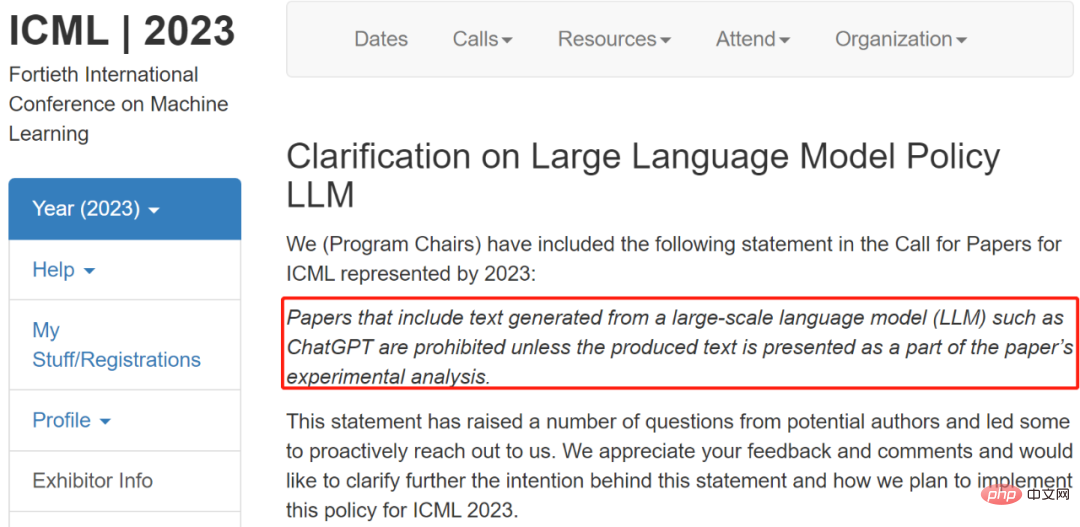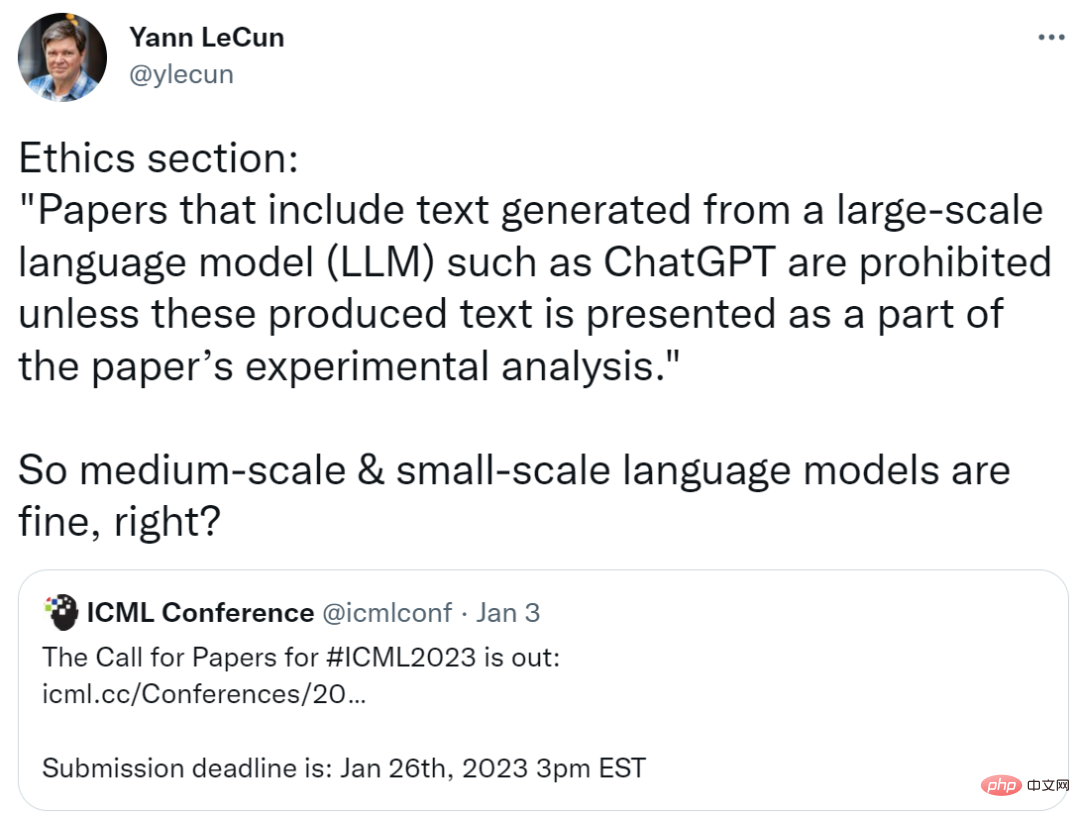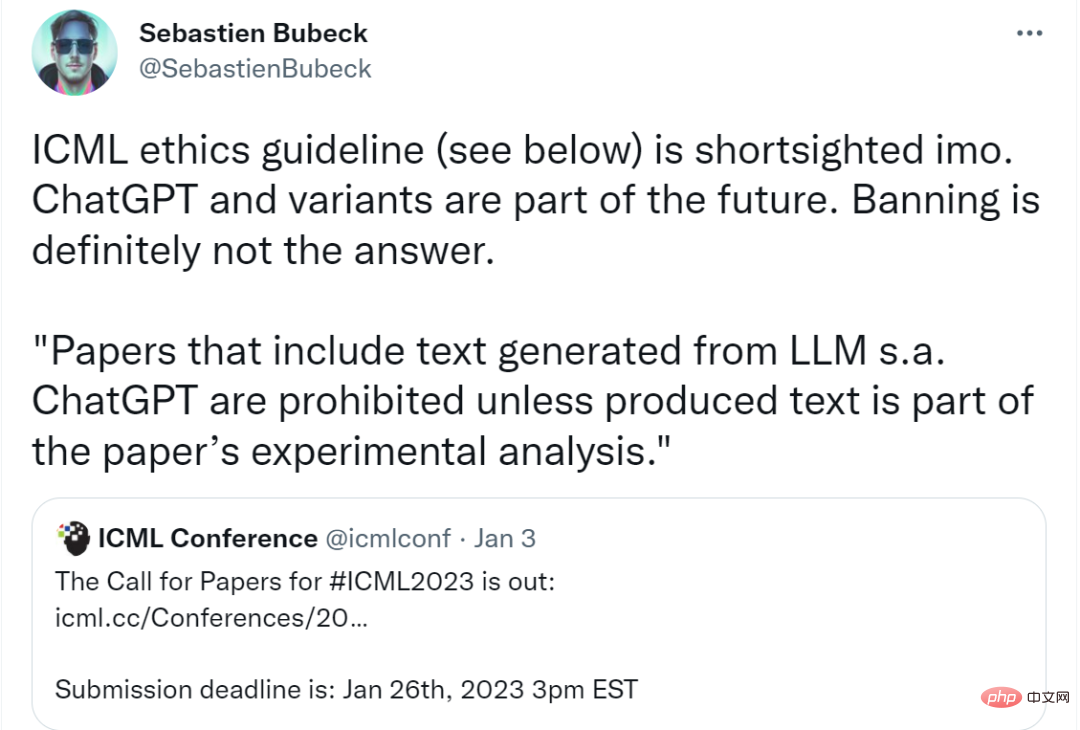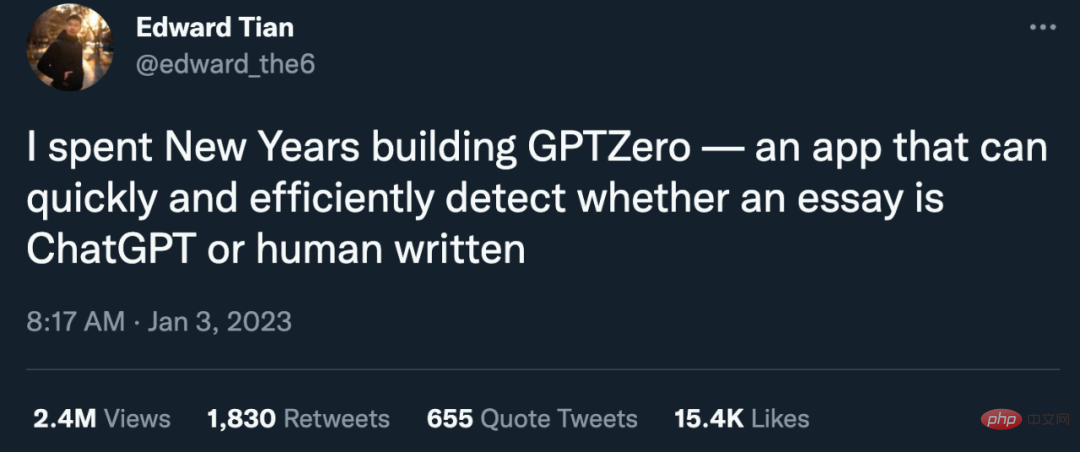 Technology peripherals
Technology peripherals
 AI
AI
 ChatGPT has been banned from entering schools. AI will change the rules specially. LeCun: How about we also ban small models?
ChatGPT has been banned from entering schools. AI will change the rules specially. LeCun: How about we also ban small models?
ChatGPT has been banned from entering schools. AI will change the rules specially. LeCun: How about we also ban small models?
If you want to ask which model is the most popular in the AI industry in recent times, nine out of ten people will vote for ChatGPT. There is no way, this model is too popular, just because it can do things Too much. Many people describe it as a real "hexagonal warrior": not only can it be used to chat, search, and translate, but it can also be used to write stories, write code, debug, and even develop small games and take the American college entrance examination... Some people joke that from now on There will be only two types of artificial intelligence models in the future - ChatGPT and others.
On the one hand, ChatGPT’s capabilities are so amazing that it is loved by the public. On the other hand, it is also in constant trouble and has been banned by different agencies. Some time ago, there was news that Stack Overflow had banned ChatGPT for no other reason. The official stated that ChatGPT was temporarily banned because the accuracy of the answers it generated was too low. Publishing answers created by ChatGPT is very important to the website and users who query the correct answers. Harmful.
Not long after this incident passed, top artificial intelligence conferences also began to ban academic papers written using ChatGPT and AI tools. Let’s see what’s going on specifically.
ICML prohibits the use of large language models to write papers
A few days ago, the International Machine Learning Conference ICML announced that it is prohibited to use large language models (LLM, such as ChatGPT) to generate papers. thesis, unless the generated text is presented as part of an experimental analysis of the thesis.

##File address: https://icml.cc/Conferences/2023/llm-policy
According to ICML, although language models such as ChatGPT represent a future development trend, they are followed by some unintended consequences and problems that are difficult to solve. ICML said ChatGPT was trained on public data, often collected without consent, and who is responsible if something goes wrong.
There is also the issue of authorship, who "wrote" the paper: machine or human? This is especially important considering that ICML only prohibits text that is fully generated by AI. Conference organizers say they do not prohibit the use of tools such as ChatGPT to edit or polish text written by authors, noting that many authors already use semi-automatic editing tools such as grammar correction software Grammarly to polish their articles.
However, as soon as this news came out, it still triggered a big discussion on social media. Yann LeCun forwarded and commented: "Large language models cannot be used, so medium and small language models are Isn’t it still usable?"

Sebastian Bubeck, head of the ML foundation team at Microsoft Research, called the rule "short-sighted" and promoted it. It reads: "ChatGPT and its variants are part of future technological development. Banning is definitely not the optimal answer."

There have always been varying concerns about the harmful effects of artificial intelligence-generated text. One of the most common problems is that the output from these systems is simply unreliable.
AI models are trained to predict the next word in any given sentence, but they don’t have a hard-coded database of “facts” to draw from, so the model’s generated results often A paradoxical situation. Many times, the generated sentences conform to grammatical logic but do not conform to objective reality.
There is another problem that is also very difficult - it is difficult to distinguish whether the text is "polished and edited" by AI or completely generated by AI. This problem is very serious for papers. If the author uses an AI model to generate a concise summary based on the paper, is this considered editing the text or generating the text from scratch?
Of course, using AI tools like ChatGPT is not the only drawback. For example, in peer review, fluent English expressions tend to receive higher evaluations, and AI models can help non-native English-speaking paper authors generate more fluent English texts. This will save researchers time and create a more level playing field in the academic field. But it should be noted that ChatGPT is a large language model (LLM), which is very different from simple grammar correction software such as Grammarly. The main function of LLM itself is not to adjust the structure and language of already written texts, but to generate some new texts. In fact, almost no paper authors will actually use AI language models to generate academic papers. Because the requirements for academic papers are very strict, authors generally check the contents of the paper repeatedly before publishing. If there are errors in a paper generated using AI, the reputations of all named paper authors will be seriously affected, affecting their entire careers. From the perspective of paper review, people need a fast and effective detection tool to distinguish whether an article is generated by AI or manually written. Recently, a developer released a new application called GPTZero that has this detection function. GPTZero was developed by Princeton University computer science student Edward Tian and is evaluated using two different metrics Whether the text was written by an AI model: perplexity and burstiness. This may be using "model" to defeat "model". At almost the same time, ChatGPT was banned by the school. The New York City Department of Education has blocked access to ChatGPT on its network and devices over concerns that AI tools could disrupt education. Jenna Lyle, a spokesperson for the department, said: This ban is mainly due to concerns about the potential negative impact of ChatGPT on student learning, as well as the safety and accuracy of the content generated by ChatGPT. Worry. While this tool can provide quick and easy answers, it fails to develop the critical thinking and problem-solving skills that are critical to students’ academic and lifelong success. In addition, ChatGPT also has problems that other language models have. Because its training data comes from the internet, it often repeats and amplifies things like sexism and racial bias in its answers. This type of language model also tends to fabricate information, from historical dates to scientific laws, but others generally cannot detect that it is fabricating information. It is these factual errors that have educators particularly worried about this tool. Many teachers say that software like ChatGPT is essentially impossible to test students’ ability to write essays. If ChatGPT could help students write in a matter of seconds, they wouldn't want to put the effort into writing. Others, however, argue that the education system will have to adapt to the emergence of this technology — just as it adapted to earlier disruptive technologies like Google Search and Wikipedia. But it obviously takes some time for everyone to adapt to ChatGPT. Whether it is manually formulating and enforcing text writing specifications, or using some methods to tell whether text is generated by AI, it shows that people are aware of the urgent need to standardize the use of text generation models such as ChatGPT. The use cases and value of ChatGPT are still to be defined. 
New York City schools banned access to ChatGPT
The above is the detailed content of ChatGPT has been banned from entering schools. AI will change the rules specially. LeCun: How about we also ban small models?. For more information, please follow other related articles on the PHP Chinese website!

Hot AI Tools

Undresser.AI Undress
AI-powered app for creating realistic nude photos

AI Clothes Remover
Online AI tool for removing clothes from photos.

Undress AI Tool
Undress images for free

Clothoff.io
AI clothes remover

AI Hentai Generator
Generate AI Hentai for free.

Hot Article

Hot Tools

Notepad++7.3.1
Easy-to-use and free code editor

SublimeText3 Chinese version
Chinese version, very easy to use

Zend Studio 13.0.1
Powerful PHP integrated development environment

Dreamweaver CS6
Visual web development tools

SublimeText3 Mac version
God-level code editing software (SublimeText3)

Hot Topics
 How to output a countdown in C language
Apr 04, 2025 am 08:54 AM
How to output a countdown in C language
Apr 04, 2025 am 08:54 AM
How to output a countdown in C? Answer: Use loop statements. Steps: 1. Define the variable n and store the countdown number to output; 2. Use the while loop to continuously print n until n is less than 1; 3. In the loop body, print out the value of n; 4. At the end of the loop, subtract n by 1 to output the next smaller reciprocal.
 What are the types of return values of c language function? Summary of types of return values of c language function?
Apr 03, 2025 pm 11:18 PM
What are the types of return values of c language function? Summary of types of return values of c language function?
Apr 03, 2025 pm 11:18 PM
The return value types of C language function include int, float, double, char, void and pointer types. int is used to return integers, float and double are used to return floats, and char returns characters. void means that the function does not return any value. The pointer type returns the memory address, be careful to avoid memory leakage.结构体或联合体可返回多个相关数据。
 What are the pointer parameters in the parentheses of the C language function?
Apr 03, 2025 pm 11:48 PM
What are the pointer parameters in the parentheses of the C language function?
Apr 03, 2025 pm 11:48 PM
The pointer parameters of C language function directly operate the memory area passed by the caller, including pointers to integers, strings, or structures. When using pointer parameters, you need to be careful to modify the memory pointed to by the pointer to avoid errors or memory problems. For double pointers to strings, modifying the pointer itself will lead to pointing to new strings, and memory management needs to be paid attention to. When handling pointer parameters to structures or arrays, you need to carefully check the pointer type and boundaries to avoid out-of-bounds access.
 How to use C language function pointer to find the maximum value of a one-dimensional array
Apr 03, 2025 pm 11:45 PM
How to use C language function pointer to find the maximum value of a one-dimensional array
Apr 03, 2025 pm 11:45 PM
Flexible application of function pointers: use comparison functions to find the maximum value of an array. First, define the comparison function type CompareFunc, and then write the comparison function compareMax(a, b). The findMax function accepts array, array size, and comparison function parameters, and uses the comparison function to loop to compare array elements to find the maximum value. This method has strong code reusability, reflects the idea of higher-order programming, and is conducive to solving more complex problems.
 How to use the c language function pointer as return value
Apr 03, 2025 pm 11:42 PM
How to use the c language function pointer as return value
Apr 03, 2025 pm 11:42 PM
Function pointers can be used as return values to implement the mechanism of returning different functions according to different inputs. By defining the function type and returning the corresponding function pointer according to the selection, you can dynamically call functions, enhancing the flexibility of the code. However, pay attention to the definition of function pointer types, exception handling and memory management to ensure the robustness of the code.
 What are the rules for function definition and call in C language?
Apr 03, 2025 pm 11:57 PM
What are the rules for function definition and call in C language?
Apr 03, 2025 pm 11:57 PM
A C language function consists of a parameter list, function body, return value type and function name. When a function is called, the parameters are copied to the function through the value transfer mechanism, and will not affect external variables. Pointer passes directly to the memory address, modifying the pointer will affect external variables. Function prototype declaration is used to inform the compiler of function signatures to avoid compilation errors. Stack space is used to store function local variables and parameters. Too much recursion or too much space can cause stack overflow.
 How to define the call declaration format of c language function
Apr 04, 2025 am 06:03 AM
How to define the call declaration format of c language function
Apr 04, 2025 am 06:03 AM
C language functions include definitions, calls and declarations. Function definition specifies function name, parameters and return type, function body implements functions; function calls execute functions and provide parameters; function declarations inform the compiler of function type. Value pass is used for parameter pass, pay attention to the return type, maintain a consistent code style, and handle errors in functions. Mastering this knowledge can help write elegant, robust C code.
 CS-Week 3
Apr 04, 2025 am 06:06 AM
CS-Week 3
Apr 04, 2025 am 06:06 AM
Algorithms are the set of instructions to solve problems, and their execution speed and memory usage vary. In programming, many algorithms are based on data search and sorting. This article will introduce several data retrieval and sorting algorithms. Linear search assumes that there is an array [20,500,10,5,100,1,50] and needs to find the number 50. The linear search algorithm checks each element in the array one by one until the target value is found or the complete array is traversed. The algorithm flowchart is as follows: The pseudo-code for linear search is as follows: Check each element: If the target value is found: Return true Return false C language implementation: #include#includeintmain(void){i





